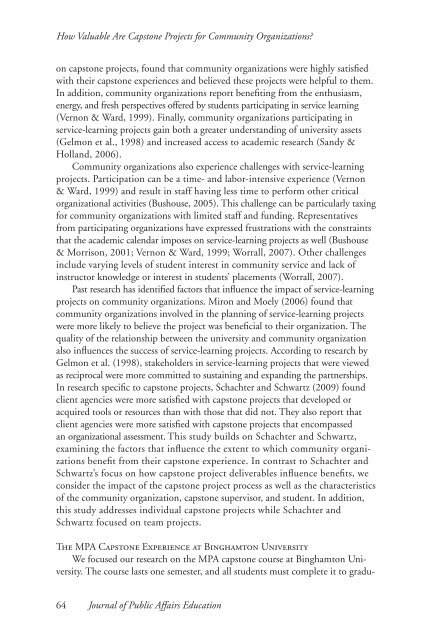Journal of Public Affairs Education
Create successful ePaper yourself
Turn your PDF publications into a flip-book with our unique Google optimized e-Paper software.
How Valuable Are Capstone Projects for Community Organizations?<br />
on capstone projects, found that community organizations were highly satisfied<br />
with their capstone experiences and believed these projects were helpful to them.<br />
In addition, community organizations report benefiting from the enthusiasm,<br />
energy, and fresh perspectives <strong>of</strong>fered by students participating in service learning<br />
(Vernon & Ward, 1999). Finally, community organizations participating in<br />
service-learning projects gain both a greater understanding <strong>of</strong> university assets<br />
(Gelmon et al., 1998) and increased access to academic research (Sandy &<br />
Holland, 2006).<br />
Community organizations also experience challenges with service-learning<br />
projects. Participation can be a time- and labor-intensive experience (Vernon<br />
& Ward, 1999) and result in staff having less time to perform other critical<br />
organizational activities (Bushouse, 2005). This challenge can be particularly taxing<br />
for community organizations with limited staff and funding. Representatives<br />
from participating organizations have expressed frustrations with the constraints<br />
that the academic calendar imposes on service-learning projects as well (Bushouse<br />
& Morrison, 2001; Vernon & Ward, 1999; Worrall, 2007). Other challenges<br />
include varying levels <strong>of</strong> student interest in community service and lack <strong>of</strong><br />
instructor knowledge or interest in students’ placements (Worrall, 2007).<br />
Past research has identified factors that influence the impact <strong>of</strong> service-learning<br />
projects on community organizations. Miron and Moely (2006) found that<br />
community organizations involved in the planning <strong>of</strong> service-learning projects<br />
were more likely to believe the project was beneficial to their organization. The<br />
quality <strong>of</strong> the relationship between the university and community organization<br />
also influences the success <strong>of</strong> service-learning projects. According to research by<br />
Gelmon et al. (1998), stakeholders in service-learning projects that were viewed<br />
as reciprocal were more committed to sustaining and expanding the partnerships.<br />
In research specific to capstone projects, Schachter and Schwartz (2009) found<br />
client agencies were more satisfied with capstone projects that developed or<br />
acquired tools or resources than with those that did not. They also report that<br />
client agencies were more satisfied with capstone projects that encompassed<br />
an organizational assessment. This study builds on Schachter and Schwartz,<br />
examining the factors that influence the extent to which community organizations<br />
benefit from their capstone experience. In contrast to Schachter and<br />
Schwartz’s focus on how capstone project deliverables influence benefits, we<br />
consider the impact <strong>of</strong> the capstone project process as well as the characteristics<br />
<strong>of</strong> the community organization, capstone supervisor, and student. In addition,<br />
this study addresses individual capstone projects while Schachter and<br />
Schwartz focused on team projects.<br />
The MPA Capstone Experience at Binghamton University<br />
We focused our research on the MPA capstone course at Binghamton University.<br />
The course lasts one semester, and all students must complete it to gradu-<br />
64 <strong>Journal</strong> <strong>of</strong> <strong>Public</strong> <strong>Affairs</strong> <strong>Education</strong>



